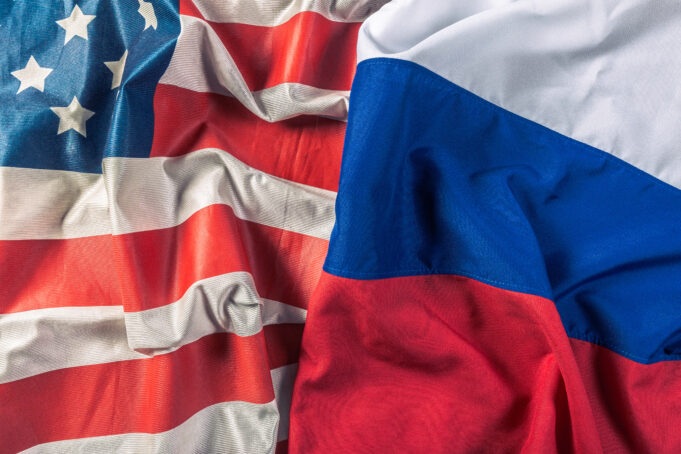During a recent press briefing from South Africa, the U.S. Ambassador to South Africa, Reuben Brigety, leveled accusations that weapons were being loaded onto a Russian vessel which is under U.S. sanctions. However, Redge Nkosi, a former member of the administration of Nelson Mandela, made the distinction that the vessel was “not sanctioned by the United Nations.”

Nkosi was very critical of the U.S. ambassador, who said during the press briefing that “we are confident that weapons were loaded onto that vessel,” a position that he added that he “would bet his life on.” Nkosi told Africa Watch, the South African government condemned the ambassador’s accusation as “megaphone diplomacy,” and accused the ambassador, who is Black, of doing the bidding of those that think they can put Africans in their place.
South Africa’s Department of International Relations and Cooperation (DIRCO) is slated to “demarcate” or put out a statement of protest to the U.S. ambassador. Clayson Monyela, Deputy Director-General of Public Diplomacy of DIRCO, said in a tweet, that “#SouthAfrica values the relations we have with the United States of America. They’re cordial, strong, and mutually beneficial.” He also said that Foreign Minister Naieda Pandor, before the end of the day, would speak to her counterpart, U.S. Secretary of State Anthony Blinken.
Monyela ended his statement by saying, “The National Conventional Arms Control Committee has no record of an approved arms sale by the state to Russia related to the period/incident in question. We, therefore, welcome the inquiry established by HE President Cyril Ramaphosa to establish the facts and role players. If any crimes were committed, the law will take its course.”
According to Nkosi, why Ambassador Brigety made these unsubstantiated claims ahead of the pre-BRICS Summit in June and the BRICS Summit in South Africa in August is suspect.

Nkosi will be a presenter at the BRICS Summit. He is an economist and the Pretoria-based founder and executive director of First Source Money and Public Banking of South Africa.
He said the United States and Europe can no longer tell Africa whom it can befriend. Quoting Nelson Mandela, he said, Madiba told “U.S. President Bill Clinton ‘to jump into the sea’ and never tell South Africa who it can or cannot make friends with.’” Concerning the statement made by the U.S. ambassador, Nkosi argued that his credibility with Africans has substantially decreased.
Nkosi and other observers state that the root of Ambassador Reuben Brigety’s remarks to the press is the currency crisis the U.S. is finding itself in. “The United States, which has been the dominant force in international financial transactions through the influence of the U.S. dollar as a global currency arising out of the Bretton Woods system since the end of World War II, now sees that its currency is losing its reserve status at a much faster pace than expected. The U.S. administration has always seen its dollar as a weapon to suppress other countries,” noted english.almayadeen.net, an Arab Independent Media Satellite Channel.
“Refaat Badawi, a political analyst and advisor to former Lebanese Prime Minister Salim Al-Hoss, wrote an article for China’s Xinhua News Agency on April 18, 2023, where he cited an interview of economist Jeffrey D. Sachs with Sky News. The American economist predicted a dramatic end to the U.S. dollar soon, adding that America will lose its primary weapon of pressure, which it has always used to blackmail countries of the world.”
The history of America and its international currency has been, with its U.S. dollar hegemony, the dominant force in international financial transactions. The 1944 Bretton Woods conference created a system pegged to the U.S. dollar which until 1971 under then President Richard Nixon was pegged to the price of gold.
According to a 2002 International Monetary Fund Working Paper: The international monetary system is largely the product of negotiations during World War II between the U.S. and U.K. officials, led respectively by (economist) Harry Dexter White and John Maynard Keynes. The design of the system, especially the IMF, reflects the U.S. plan much more than the British. T
he outcome resulted not only from the superior economic position of the U.S. but also from differences between White’s and Keynes’s views. In reality, the working paper explained, “it was America’s economic might that was used to control the outcome.”
Nkosi noted that when the U.S. dollar—no longer backed by gold—became the currency of exchange it began abusing this almost absolute power. “When the U.S. dollar increased in value it could easily purchase from these poor small countries whose currencies it helped depreciate.
The U.S. would actually deliberately condemn these Global South countries to economic poverty for as long as it was able to secure their strategic minerals and strategic assets,” said Nkosi. He added that the U.S. “ravished these poor countries’ mineral and natural resources without ever considering the consequences of their actions.”
A mainstay idea at the upcoming BRICS Summit is the creation of a common reserve currency. Whether, according to media reports, it’s the Chinese yuan or the Indian rupee, it is scheduled to be announced in South Africa in August 2023. The purpose of a common reserve currency is to remove the U.S. dollar from the “throne of the international economy.”
Follow @JehronMuhammad on Twitter













